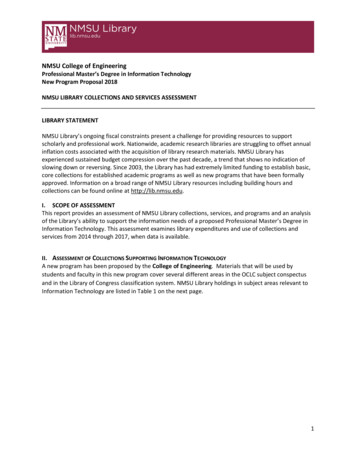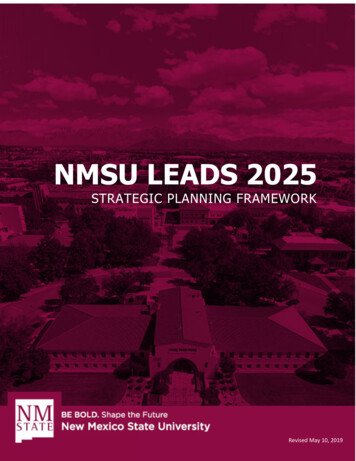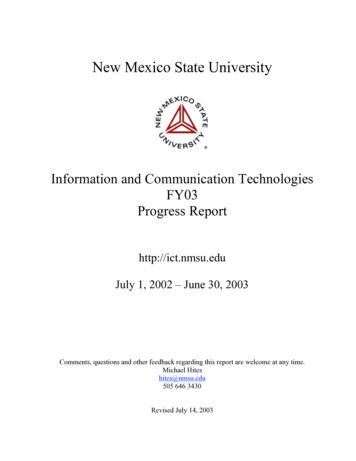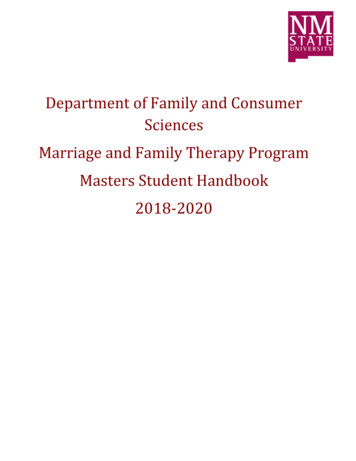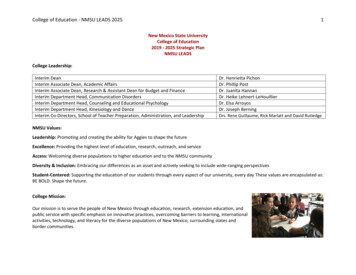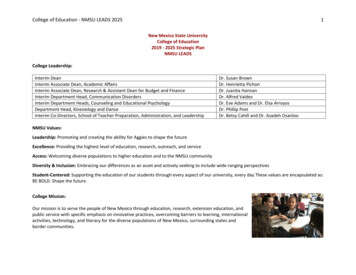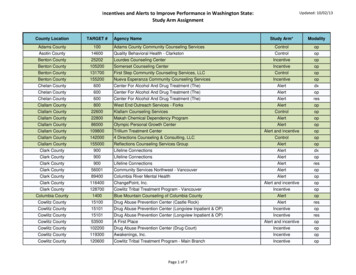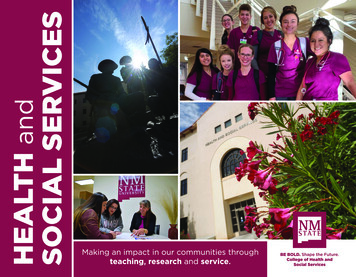
Transcription
T(CHSS) not only preparesstudents for success in the health science fields, we also pride ourselvesin supplying the State of New Mexico with the security of publichealth and well-being for the future through quality education. Our mission isto provide students and the community with academic programs that addressissues affecting the quality of life in our rapidly changing society.Our college prepares graduates with the knowledge required to make apositive impact in their communities. Additionally, the programs we offer aregeared towards improving the lives of individuals, families and communities.We offer degrees in nursing, public health and social work, and it is an honor toeducate students who will meaningfully serve our citizens. Our faculty conductresearch and design improvements in health services, well-being and quality oflife issues, many with a focus on the Border Region.CHSS embraces the diversity of New Mexico and the unique landscape ofour state. Our classes are designed to ensure that our graduates are prepared tocontribute to the vibrant nature of the state.During these unprecedented times when the health of the world is at theforefront in everyone’s minds, we as educators feel a great sense of pride knowingthat so many of those serving our public were once in our lecture halls.As the interim dean for the college, it is my pleasure to guide the expansion of our programs and facilities as webuild on our past strengths and look towards the future. We have exciting plans for our health science programs atNMSU, and are developing organizational and implementation strategies that will have the most beneficial impact onour students and community. From enrolling and graduating more students to fulfill our workforce needs, to valuablecontributions in research outcomes and community engagement, the possibilities are endless and we intend to deliver!I invite you to explore our newest CHSS publication, our website and get involved in our college; there issomething for everyone at the College of Health and Social Services!he College of Health and Social ServicesSonya CooperInterim DeanNMSU AND COVID-19Many photos in this publication were created prior to the COVID-19 pandemic,before rules regarding masks and social distancing, among others, took effect. Forinformation on how the NMSU community works to stay safe, go to ready.nmsu.edu.Since its founding, the College of Health and Social Services (CHSS), has dedicateditself to fulfilling its mission to serve the needs of New Mexico’s diverse populationthrough education, research and service in the areas of health and social well-being.Today, CHSS serves more than 1,300 students across New Mexico; boasts more than8,000 alumni; and offers four baccalaureate programs, three master’s degree programs andone Ph.D. program. This is our story.NMSU created its first-ever degree program in social welfare in 1970 through theContinuing Education Office, and then launched a two-year nursing program in 1972after a yearlong study found broad support for having a nursing curriculum at NMSU.In 1975, the nursing program expanded to four years, allowing students toreceive certification as licensed practical nurses, train as registered nurses, and earn abachelor’s degree in nursing.Four years later, NMSU established the College of Health and CommunityServices, the university’s centralized home for the only accredited programs insouthern New Mexico for nursing, social work and public health students. LoweryDavis served as the college’s first dean.Loui Reyes, the interim director for the School of Social Work, was among the firststudents from NMSU to graduate with a bachelor’s degree in social work in 1978 – theyear the program earned accreditation.“The program was a perfect fit for me,” Reyes said. “I started in the Collegeof Business, but when I was a sophomore, I took an elective called ‘Social WorkIntroduction.’ The professor was just so great, and I said this is what I’m called to be. Iwant to work with people and for the people.”In 1995, the college changed its name to the College of Health and Social Servicesunder the leadership of its second dean, Virginia C. Higbie. Another major turning pointfollowed in 2004 under the leadership of the college’s third dean, Jeffrey Brandon.That year, after more than a decade of planning and developing, the college movedinto a home of its own – a 69,000-square-foot building – at the center of campus. Beforethe building opened, CHSS had its three departments scattered throughout campus.“This milestone of having our first new home, and our obtaining approval tofocus solely upon our three academic programs, led to our identity as a full-fledgedcollege,” Brandon said. “It also led to valuable faculty collaboration across programs, asdemonstrated by its first college-wide Southwest Center for Health Disparities Researchand a similar center funded by the U.S. Health Resources and Services Administrationfunded in the School of Nursing, led by Dr. Mary Hoke.”Said Sue Forster-Cox, professor and online coordinator in the Department ofPublic Health Sciences, “It wasn’t until we got into that building, under one roof, thatwe felt like a college.”In the decades since its founding, CHSS has experienced steady growth instudent enrollment, thanks to distance and online education, as well as the additionof innovative programs, including graduate programs in social work and public healthand a Ph.D. program in nursing.“We have been one of the most resilient colleges at NMSU,” said Satyapriya Rao,department head for the Department of Public Health Sciences. “We’ve gone throughups and downs, but we’ve always believed in ourselves and tried to make a difference inour communities and with our students.”2019 marked the 40th anniversary of CHSS. To commemorate the milestone,the college celebrated its legacy of making a difference during NMSU’s Homecomingfestivities in October of 2019. It also launched an anniversary scholarship to benefitstudents in the college’s three academic departments.“The success of this college over the last 40years is a testament of the commitment of thefaculty, staff and students who are passionateabout creating change and improving lives. Weare excited about the next 40!”— Sonya Cooper, Interim DeanCollege of Health and Social Services 1
PARENTAL WELLNESSThe New Mexico Department of Health’s Office of Border Health awarded grants toresearchers in the School of Nursing to fund projects that separately examined theaccuracy of a mobile translation device during mental-health evaluations and created anonline, self-care resource for those experiencing urinary incontinence.In the first project, researchersconducted a study to determine theaccuracy of a mobile device andsmartphone app that have the ability totranslate speech in real time.Composed of two sets of wirelessearbuds, the device operates with acorresponding smartphone app thattranslates speech into a selected languagewith a tap of a button. To use the device,users must wear the earbuds and speakLynch, faculty member Lynette Summers and their researchdirectly into the phone with the appteam received a grant from the New Mexico Department ofHealth’s Office of Border Health to fund the project.running, talking in their native languages.The app then translates the speech and feeds translations into the earbuds.The research team at NMSU — which includes Stephanie Lynch, Lynette Summers,Conni DeBlieck, Shelly Noe and Jackie Williams, all faculty members in NMSU’sSchool of Nursing — views the device as a possible solution to improve health-carecommunication in rural communities along the United States-Mexico border, wherelanguage barriers exist between patients and providers.In a separate project that also received a grant from the Office of Border Heath,Lori Saiki, assistant professor in NMSU’s School of Nursing, developed a web-based,Lori Saiki, an associate professor in the School of Nursing, received a yearlong grantto study the effectiveness of the program “And Baby Makes Three,” a program thatoffers participants strategies and techniques for calminga crying baby and getting quality sleep and includestips for recovering from childbirth, lowering stress andmaking emotional adjustments. The grant was awardedby the Association of Women’s Health, Obstetric andNeonatal Nurses, an Atlanta-based nonprofit. The studyis in partnership with La Clínica de Familia and is beingconducted throughout Doña Ana County. In additionto the grant, Saiki received the Hill-Rom Celeste PhillipsLori SaikiFamily-Centered Maternity Care Award for research efforts.2 College of Health and Social ServicesNMSU SCHOOL OF NURSING TACKLES OPIOID EPIDEMIC IN NM WITH TWOFEDERAL GRANTSIn the last two years, NMSU’s School of Nursing has received more than 1.5 million infederal grants to tackle the opioid epidemic in NM.In 2019, the NMSUSchool of Nursing received athree-year, 1.35 million federaltraining grant from the U.S.Health Resources and ServicesAdministration to expandthe number of mental healthprofessionals in New MexicoShelly NoeEve AdamsSTUDY FINDS HIGH RATE OF CESAREAN BIRTHS AMONG HISPANIC WOMEN IN BORDERA New Mexico State University research team, led by NMSU public health sciencesprofessor Jill McDonald, discovered that Hispanic women living in the United States’southwest-border region have a cesarean rate higher than that of other Hispanicwomen in the border states and U.S. Hispanic women overall. Published in the healthcare journal Health Affairs, the research shows that 38.3 percent of births in 2015 byHispanic women living in border-region counties, spanning California, Arizona, NewMexico and Texas, were cesarean. By contrast, the Hispanic cesarean rate in the restof the border states was 30.9 percent. Hispanic rates also far exceeded non-Hispanicwhite rates on the border. The study was funded by a 100,000 grant from the HealthResources and Services Administration.Linda SummersCLINICAL TRIAL EVALUATES THE EFFECTIVENESS OF CANCER EDUCATION PROGRAMJOSH BACHMANCARLOS ANDRES LOPEZGRANT ALLOWS RESEARCHERS TO EXAM PROGRAM THAT PROMOTESNURSING PROJECTS TO HELP BORDER RESIDENTSwho are trained in interprofessional settings to effectively prevent and treat opioid-use andsubstance-abuse disorders in community-based practices. This grant is being led by ShellyNoe, assistant professor in the School of Nursing and Eve Adams, a Regents Professor inDepartment of Counseling and Educational Psychology.In April 2020, the NMSU School of Nursingreceived a 200,000 grant from the U.S. Departmentof Health and Human Services. The grant will providefunding for faculty members in the Family NursePractitioner program to develop a curriculum thatemphasizes integrated mental health and primary care,with content on non-opioid alternatives for managingacute and chronic pain. The project director is LindaSummers, chairholder of the Memorial Medical CenterEndowed Professorship and director of the FNP program.JOSH BACHMANeducational resource that helps people in the border region who experience urinaryincontinence, the loss of bladder control.Called “Train-the-Trainer,” the resource is geared toward community health workers andteaches self-care strategies to better manage urinary incontinence. Saiki worked in partnershipwith the southern New Mexico community health workers known as promotoras de salud.DeBlieck and Martha Morales, another faculty member in NMSU’s School ofNursing, also worked on the project.COURTESY PHOTOMaking an impact with compassion and purpose — thatis what we work for everyday and what we continuouslystrive to make better with our research efforts. Our facultycreate valuable knowledge that strengthen our community. Ourresearchers make amazing discoveries that help improve thewell-being of our citizens. We are committed to taking on thechallenges of today and exploring the possibilities for change.A research team at NMSU is workingon one of the university’s first clinicaltrials to evaluate the effectiveness of acancer-parenting education programadapted for Hispanic mothers recentlydiagnosed with early-stage cancer whohave children between the ages of 5 and17. Conexiones is based on the cancereducation program called EnhancingA research team led by Rebecca Palacios, center, associateConnections,a behavioral interventionprofessor in the Department of Public Health Sciences,launched one of the university’s first clinical trials in 2019 todeveloped by the Fred Hutchinsonevaluate the effectiveness of a cancer education programadapted for Hispanic women with school-age children.Cancer Research Center for nonThe clinical trial will continue until 2021. The research teamHispanic white women. The clinicalincludes, from left, Adriena Hernandez, Clara Reyes, Palacios,Karoline Sondgeroth and Isela Garcia.trial comes after Rebecca Palacios,an associate professor in the Department of Public Health, spent two years culturallyadapting the original program to suit Hispanic mothers and their specific challenges ofbeing diagnosed with cancer while raising school-age children.Faculty members Jill McDonald, right, and Charlotte Gard, left, were part of an NMSU research team thatdiscovered Hispanic women living in the border region in the United States were more likely to have a cesareanbirth than other Hispanic women in border states and U.S. Hispanic women overall.College of Health and Social Services 3
CHILD WELFARE, IMMIGRATION ISSUES HIGHLIGHT FINNO-VELASQUEZ’S CAREERMegan Finno-Velasquez, an assistant professor at the School of Social Work anddirector of the Center on Immigration and Child Welfare at NMSU in Albuquerque,has spent the past 14 years working with child welfare and immigration issues.She started working on immigration issues during herMaster of Social Work program at Loyola University Chicago,where she worked with the Illinois child welfare system on afederal immigration training project and also on a summerproject with Jesuit Migrant Services in Veracruz, Mexico.“My research focuses on the impact of immigrationpolicy on child welfare system experiences, culturallycompetent maltreatment prevention strategies andimproving child welfare service system response to the needsMegan Finno-Velasquezof immigrant families,” Finno-Velasquez said.Finno-Velasquez is also CYFD’s immigration affairs director, where she works to improvepolicies and practices around serving immigrant children and families across the state.In September 2019, Finno-Velasquez led a talk on “Immigration Enforcement andOur Role in Protecting Children and Families,” during a Hispanic-Serving InstitutionsWeek event, which was sponsored by NMSU Chicano Programs.NMSU CELEBRATES GLOBAL WELLNESS CAMPAIGN WITH CHANCELLOR WALKSince 2016, New Mexico State University has been participating in Exercise isMedicine on Campus, a wellness initiative that engages students, faculty and staffat universities across the world in ongoing efforts to improve physical fitness, healthand wellness. NMSU was the first university in New Mexico to participate andcurrently has a silver-level recognition from the organization.Every year, NMSU joins more than 250 universities worldwide in hosting health andwellness walks in October. NMSU Chancellor Dan Arvizu led the 2019 walk that started on4 College of Health and Social Servicesthe east side of Hadley Hall andended in front of Corbett CenterStudent Union, where Arvizusigned a proclamation supportingNMSU’s health and wellness efforts.Public health studentsorganized the walk incollaboration with the AggieHealth and Wellness Centerand the Wellness, Alcohol andViolence Education Program.“A study conducted atwalk to Corbett Center Student Union at New Mexico StateNorth Carolina State University ParticipantsUniversity as part of the Chancellor Walk to celebrate the university’sparticipation in the Exercise is Medicine on Campus initiative.found that students whoexercise regularly in recreational activities are more likely to succeed academically,”Associate Professor Cindy Kratzke said.CARLOS ANDRES LOPEZAs our world continues to change at a rapid pace,community partnerships and industry collaborations arecritical now more than ever. We continually extend ourexpertise to health and social service agencies to more effectivelyaddress the health concerns and needs of our communities.PUBLIC HEALTH HEROES HONOREDANGEL TREE GIFT DRIVE PROVIDES PRESENTS FOR AT-RISK CHILDREN AND YOUTHThe Department of Public Health Sciences honored three public health heroes fromDoña Ana County during the fifth annual Public Health Heroes Awards, held as part ofNational Public Health Week in April of 2019.Each year, public health sciences selects community health leaders to honor fortheir significant public health commitment, collaboration and contributions, said CindyKratzke, associate professor of public health and awards selection coordinator.Lorenzo Alba, executive director of Casa de Peregrinos, received the CommunityLeader Public Health Hero Award. For 40 years, Casa de Peregrinos has been providingsupplemental nutritional groceries and other services to hungry and food insecurefamilies in Las Cruces and Doña Ana County.Ruben Marquez, assistant executive director of Southern New Mexico DiabetesOutreach, received the Community Rising Star Public Health Hero Award. This newaward honors a professional starting out in the field of public health who contributessignificantly as a leader to develop healthier communities.The 2019 Angel Tree Gift Drive provided more than 180 children and youth a present lastholiday season. The drive, hosted by the Child Welfare Scholar Program, worked with Children,Youth and Families Department (CYFD) offices in the City of Las Cruces and surroundingareas to identify those in need. The children and youth were at-risk or in child welfare servicesthrough CYFD. With the help of the NMSU community and the local Moose Lodge Order,gifts were provided to all referred children and youth. The School of Social Work StudentAssociation wrapped all the donations and delivered gifts to the local CYFD office.PUBLIC HEALTH AND POLICY CONFERENCE HIGHLIGHTS STUDENT RESEARCHThe Southwest Institute for Health Disparities Research hosted a public health and policyconference called “Information to Impact (I2I): How Public Health Research Can ShapePublic Health Policy,” in April of 2019.The conference featured a panel of distinguished speakers with different perspectiveswho discussed how students can make their research useful to program and policy decisionmakers, said Jill McDonald, public health sciences professor and director of the SouthwestInstitute for Health Disparities Research. Oral and poster presentations from undergraduateand graduate students included topics such as hospital readmission after heart failure;physical activity and stress reduction; effects of immigration policy on service utilization;HIV in the border region; risk of prenatal lead exposure; substance abuse; and others.New Mexico House Rep. Joanne Ferrary, of Las Cruces, who represents District 37;Sarah Martin, director of public health at mySidewalk, a public health tech companybased in Kansas City, Missouri; Steven Sanchez, deputy superintendent for the LasCruces Public Schools; and Athena Huckaby, overdose prevention coordinator for theDoña Ana County Health and Human Services Department were panelists.CHILD WELFARE SCHOLAR PROGRAMThe Child Welfare Scholar Program is a federally grant-funded partnership betweenthe NMSU School of Social Work and CYFD through the State of New Mexico. Thisprogram is intended to recruit and retain degreed and professionally licensed socialworkers in providing child welfare services to children and families throughout the state.This partnership spans more than 25 years and has funded 270 scholar awards within theundergraduate and graduate programs. Scholars receive financial awards while in theiracademic program and enter into an empl
NMSU created its first-ever degree program in social welfare in 1970 through the Continuing Education Office, and then launched a two-year nursing program in 1972 after a yearlong study found broad support for having a nursing curriculum at NMSU. In 1975, the nursing prog

